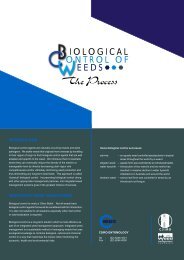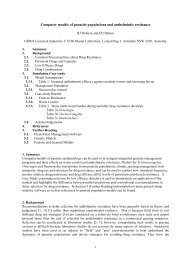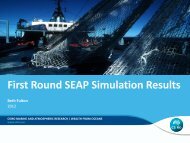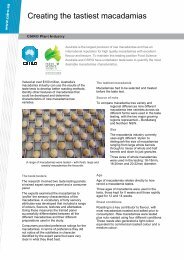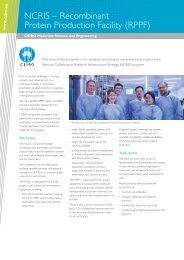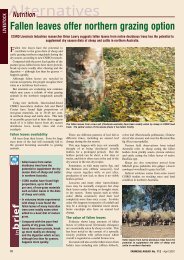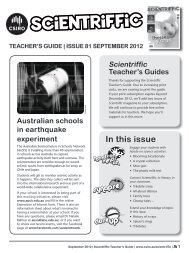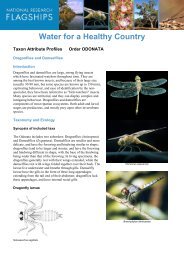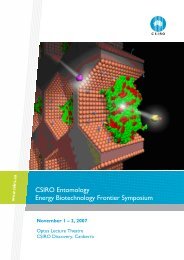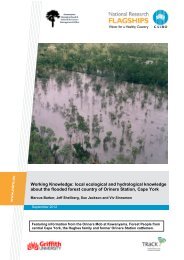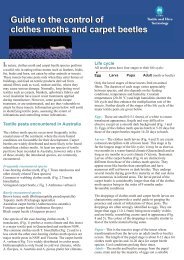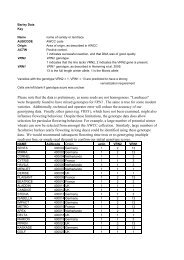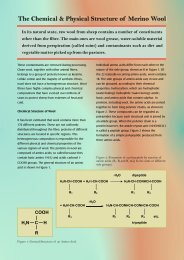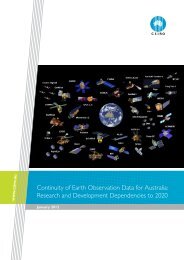The CSIRO Total Wellbeing Diet Frequently Asked Questions
The CSIRO Total Wellbeing Diet Frequently Asked Questions
The CSIRO Total Wellbeing Diet Frequently Asked Questions
Create successful ePaper yourself
Turn your PDF publications into a flip-book with our unique Google optimized e-Paper software.
TWD_FAQs_June2008.doc <strong>CSIRO</strong> Human Nutrition<br />
• High-fibre: Australian foods regulations require that a food must contain at least 1.5grams of fibre per serve<br />
before it can state that it contains fibre and 3 grams per serve before it can claim to be high- fibre. A food<br />
may either be naturally high in fibre eg wholemeal bread, or have fibre added eg white high fibre bread. A<br />
point of difference is that high fibre foods do not always contain all the outer layers of the grain.<br />
Breastfeeding and Pregnancy (see also: Calcium, Folate)<br />
Pregnancy and breastfeeding increase a woman’s nutritional requirements for key nutrients such as kilojoules,<br />
protein, omega-3 fatty acids and most vitamins and minerals including folate, iron and zinc. Eating a healthy well<br />
balanced diet is therefore important throughout pregnancy and breastfeeding and the <strong>CSIRO</strong> <strong>Total</strong> <strong>Wellbeing</strong> diet<br />
can provide the basis for good nutrition (B2 - page 33).<br />
Breastfeeding women may need up to 3 000 extra kilojoules daily. Start with Level 1 or 2 of the <strong>Total</strong> <strong>Wellbeing</strong> <strong>Diet</strong><br />
and make sure to include three serves of dairy. If you are still hungry, top up with bread and fruit. <strong>The</strong>re are some<br />
safety concerns with certain foods such as some species of fish when pregnant and we suggest you visit the link<br />
below for more information: FSANZ Fact Sheets:<br />
http://www.foodstandards.gov.au/foodmatters/pregnancyandfood.cfm<br />
Do you have any adaptations of the TWD for a breast-feeding mum? How many kilojoules should I be consuming?<br />
Should I have extra snacks?<br />
This will depend on how often you are breastfeeding which can increase your kilojoule requirements by up to 3000 if<br />
you are exclusively breastfeeding. We suggest that you start with Level 1 or 2 of the TWD & include 3 dairy serves to<br />
meet you basic nutritional needs. You can then increase the amount of bread & fruit you eat depending on appetite<br />
& energy needs. It is important to monitor your milk supply and ensure plenty of fluids, sufficient calcium (i.e. 3<br />
serves dairy per day) and regular exercise. <strong>The</strong> new recommended dietary intake for calcium while breast-feeding is<br />
1000mg/day. One unit of dairy food contains about 300mg calcium and is equal to:<br />
1. a 200g tub of yoghurt<br />
2. 250ml milk<br />
3. 100g tinned salmon (with bones)<br />
4. 35g hard cheese (these are listed on TWD page 45).<br />
Calcium (see also: Breastfeeding and pregnancy, Dairy and non-dairy)<br />
New Recommended <strong>Diet</strong>ary Intakes (RDI) and Nutrient Reference Values (NRV) for calcium<br />
Age range Calcium - Mg/day Age range Calcium - Mg/day Age range Calcium - Mg/day<br />
Men 19-70 yr 1,000 >70 yr 1,300<br />
Women 19-50 yr 1,000 51-70 yr 1,300 >70yr 1,300<br />
Pregnancy 14-18 yr 1,300 19-50 yr 1,000<br />
Lactation 14-18 yr 1,300 19-50 yr 1,000<br />
A number of web sites are listed which give a range of replies to questions about calcium in the diet:<br />
http://www.healthinsite.gov.au/topics/Calcium<br />
Cancer (position statement on Colon Cancer risk)<br />
A recent study published in the journal, Cancer Research, reported greater chemical changes in the colon when<br />
420g meat or pork was eaten for 20 days compared to a vegetarian diet. <strong>The</strong> suggestion was that this may be a<br />
marker for colon cancer. What is <strong>CSIRO</strong>’s response to the study’s findings?<br />
This study did not specify whether the meat was lean or not. However, there is no evidence yet that the change in<br />
DNA observed is in any way related to colorectal cancer. <strong>The</strong> study also found that these chemical changes were<br />
reduced by the addition of dietary fibre to the diet.<br />
Clearly this is an extreme experimental situation and meat intake was in excess of what is suggested in the <strong>CSIRO</strong><br />
<strong>Total</strong> <strong>Wellbeing</strong> <strong>Diet</strong>. Other protective components of the <strong>Total</strong> <strong>Wellbeing</strong> <strong>Diet</strong> are a high fibre, vegetable and fish<br />
intake coupled with weight loss and physical activity.<br />
Statement about “Red meat and the <strong>CSIRO</strong> <strong>Total</strong> <strong>Wellbeing</strong> <strong>Diet</strong>”<br />
“It has been estimated that approximately 70% of colorectal cancer could be avoided by changes in lifestyle in<br />
Western countries. Known risk factors include obesity, physical inactivity, high alcohol consumption, early adulthood<br />
cigarette smoking. Protective dietary factors include dietary fibre and folate.<br />
4



